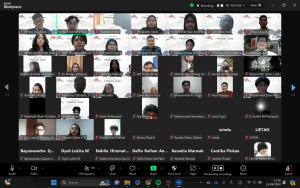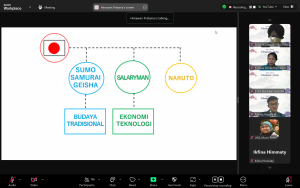The Japanese Language and Culture Study Program of the Faculty of Cultural Sciences at Diponegoro University, in collaboration with the University of Indonesia and Sebelas Maret University, successfully conducted a collaborative webinar event on “Japanese Culture” via Zoom on Monday, June 24, 2024. The purpose of this online webinar was to provide Japanese Language and Culture students from Diponegoro University, who will be selecting their specialization next semester, with a better understanding and reference regarding Japanese culture, which is one of the specializations offered by the Japanese Language and Culture Study Program at Diponegoro University. The new insights gained from this webinar are hoped to encourage students to consider choosing the Japanese culture specialization in the upcoming semester.

The enthusiasm of the participants for this webinar was very high, as seen from the number of attendees and the numerous questions during the Q&A session. The participants were eager to listen to the presentations by the two speakers: Dr. Himawan Pratama, a lecturer from the University of Indonesia, and Dr. Murni Ramli, S.P., M.Si., Ed.D, a lecturer from Sebelas Maret University.
In his presentation titled “Japanese Culture: A Multicultural Perspective,” Dr. Himawan stated that from a multicultural perspective, Japanese culture is diverse and dynamic. This perspective is driven by globalization, modernization, and acculturation. Japanese studies should be interdisciplinary, focusing on human interactions and Japan’s global context. Research should avoid relying on stereotypes and should clearly define the specific aspects of Japanese culture being studied. Understanding Japan requires recognizing its diversity and the various, sometimes contradictory, discourses about it.
In the second presentation, titled “Understanding the Character and Work Culture of the Japanese,” Dr. Murni explained that based on her work experiences in Japan, the environment is formal, with people addressing each other using surnames and honorifics, though modern companies sometimes use first names with appropriate suffixes. Office attire is typically formal. Japanese workers are meticulous in their planning and execution, ensuring high-quality products. They adhere strictly to procedures, which minimizes errors but can resist change.
From the presentations of both speakers, it can be concluded that the monocultural model views Japan as homogeneous, though it has faced criticism, while the multicultural model sees it as heterogeneous and dynamic. Japanese work culture is highly disciplined, meticulous, and loyal, influenced by values such as bushido, group harmony, collectivism, and hierarchy. Japanese culture is influenced by globalization and migration, which also affect Japanese work habits, forming a work culture that continues to be practiced today. There are many positive aspects of Japanese culture that we can learn from. Both speakers also explained the steps for starting research on Japanese culture to the participants.

The webinar concluded with a very enthusiastic Q&A session. Various questions were asked by the participants to the speakers. From the many questions posed, the moderator selected five to be answered directly by the speakers. After the Q&A session, the moderator closed the event by summarizing the presented materials and expressing gratitude to the speakers for their time and contributions to the webinar.

